Prevent and Treat The 3-Highs With TCM | High Blood Pressure, Cholesterol, Diabetes
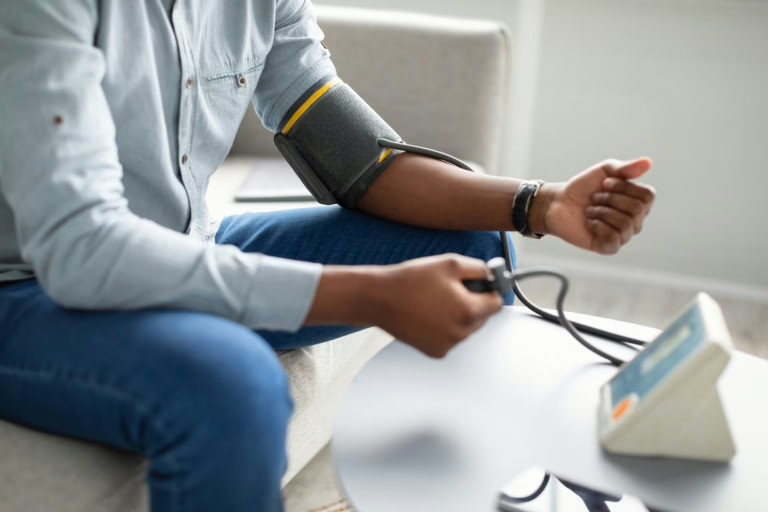
In Mandarin, the 3-Highs, otherwise known as San Gao (三高), is an umbrella term that refers to 3 commonly seen metabolic disorders known as Hypertension – high blood pressure (HBP) (高血压), Hyperlipidemia – high triglycerides (HTG) (高脂血症) and Hyperglycemia – high blood glucose (HBG) (高血糖血症). The 3-Highs are technically not TCM terms but rather the Mandarin translation for a group of 3 metabolic conditions commonly described in western medicine. Constantly elevated blood glucose that is not well-controlled can eventually lead to diabetes, which brings a host of complications that can lead to kidney problems, eye diseases, foot damage and numbness. Uncontrolled blood pressure is a risk factor for stroke and ischemic heart disease [1][2], while high triglycerides (colloquially known as high cholesterol) in the blood can cause hardening of the arteries which similarly leads to increased risk of stroke, heart attack and heart disease [3]. So now that we know what are 3-Highs and their effects, let’s understand the common causes of these common conditions: 3 Highs Common Causes Other causes Hypertension(High Blood Pressure) Stress Lack of physical activity Family history of the disorder Obesity/being overweight Diet high in salt, fat, and/or cholesterol Genetics Aging Certain medicine e.g. birth control pills Smoking or drinking too much alcohol Hyperglycemia(High Blood Glucose) Illnesses, such as colds Overeating/Over snacking between meals Certain medicines, such as steroids Hyperlipidemia(High Triglycerides) Smoking Drinking too much alcohol Eating foods high in saturated fats/trans fats In TCM, the 3-Highs are seen as symptoms and expressions of a disease or Syndrome. For instance, an individual with Liver-Fire uprising Syndrome would often present with hypertension; high blood glucose is often seen in people who have Xiao Ke Bing; high triglycerides are commonly found in individuals who fit into the Phlegm-Dampness Syndrome. Of course, these are generalisations and one should avoid self-diagnosis in the absence of a trained TCM physician. Hence, when it comes to TCM treatments, the root cause is always the target of the treatment. With successful treatments, not only will the 3-Highs be resolved but also the other symptoms and expressions that come with it. With that being said, how can TCM help alleviate symptoms of the 3-Highs? Using TCM herbs to prevent and manage the 3-Highs 1) Home remedies – TCM herbal tea a. Chrysanthemum for hypertension Ingredients: Chrysanthemum (3-5g per person) Directions: See notes below Effects: Dispel Wind and Heat, calm the Liver and improve eyesight, clear away Heat and detoxify body. Modern medical research has shown that chrysanthemum has anti-inflammatory properties, is able to dilate coronary arteries and increase coronary blood flow thereby lowering blood pressure[4]. For a blood pressure-lowering tea, this herb is often paired with Chinese Senna (Jue Ming Zi 决明子)and Prunella vulgaris (Xia Ku Cao 夏枯草). b. Mulberry leaves for hyperglycemia Ingredients: Mulberry Leaves (5-10g per person) Directions: See notes below Effects: Evacuate Wind and Heat, relieve the Exterior and clear away Heat, nourish Yin and promote fluid production. Modern medical research mentioned that mulberry leaf extracts have blood sugar-lowering effects[5]. Mulberry leaf is usually added to Cinnamon bark (Rou Gui 肉桂)and Solomonseal Rhizome (Huang Jing 黄精)for a savoury drink that has blood sugar controlling effects. c. Hawthorn fruit for hyperlipidemia Ingredients: Hawthorn Fruit (5-10g per person) Directions: See notes below Effects: To dissipate stagnation, promote Blood circulation and disperse Blood stasis, resolve Phlegm and move Qi. Modern medical research has suggested that hawthorn fruit extract has a significant benefit in symptom control and physiologic outcomes in the treatment of chronic heart failure[6]. Additionally, it has the ability to help decrease levels of triglycerides[7]. Hawthorn fruit can be combined with Notoginseng flower (San Qi Hua 三七花)and Gynostemma Pentaphyllum (Jiao Gu Lan 绞股蓝)to create a potent triglyceride-lowering beverage. Notes: For individuals with 2 or 3 of these conditions concurrently, the above-mentioned ingredients can be mixed-up and switched around to achieve the same effects. For example, an individual with both hypertension and hyperglycemia can have tea with chrysanthemum, mulberry leaf and Prunella vulgaris which is the famous Xia Sang Ju (夏桑菊) that many Chinese people are acquainted with. The number of ingredients doesn’t matter but for the sake of a tea, we normally keep the number of ingredients at 3 or lower. If you are making tea with 3 herbs for 1 person only, the amount to add is in the range of 1-5g per herb. Multiply the amount by the number of people sharing the drink accordingly. In summary, these drinks can be drunk safely over the course of a few weeks to a few months*. However, if you do not see any improvements in the conditions after 3 months of consumption, do seek a trained physician or doctor to manage them properly*. *Not suitable for pregnant women, individuals suffering from fever, patients with severe cases and individuals under medication. 2) Lifestyle and dietary changes Regardless of the treatments one does, it is always of great importance to also control what we consume in our diets. After all, this trio of metabolic conditions commonly arises from an imbalanced diet. A healthy diet high in fibre and minerals while low in processed food and salt can help to stave off the 3-Highs by slowing down the rate of absorption of glucose, while maintaining the right balance of nutrients for our body. Foods high in fibre include pumpkin, sweet potatoes and radish while minerals can be obtained from fresh fruits, vegetables or supplements. Avoid food that comes in a can as these usually contain more preservatives and additives that can be inflammatory to our body. Chronic inflammation has been known to be associated with increased risk of heart disease or stroke for 20 years, but new studies show that reducing inflammation can lower the likelihood of subsequent heart attacks or strokes by 15%[8]. Maintaining an active lifestyle is also essential for preventing and even reversing the 3-Highs. Exercise helps improve blood circulation, helps our body detox and destress, and releases endorphins – “feel good” hormones that help improve our mood and help us relax.
Combat Festive Overeating With This Essential TCM Guide
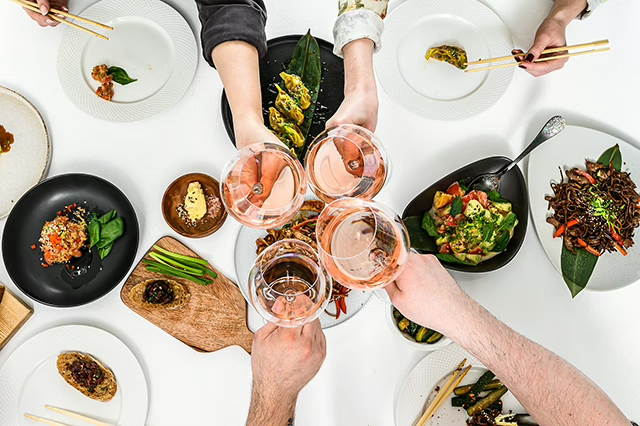
Link copied! With the festive season just around the corner, it is once again time for gatherings with family and friends over a feast of delicacies and drinks as you catch up on each other’s lives in the past year. On such occasions, the tendency to overindulge in the rich festive food typically leads to overeating which causes symptoms such as bloatedness, lethargy and adding a few undesirable pounds to the weighing scale. In fact, research suggests that people tend to gain more weight during the festive season! [1] In this article, let’s explore what is overeating in TCM and how you can relieve symptoms from festive overeating with TCM remedies, recipes and acupressure points from Physician Leow. Why is overeating bad and how to combat it? Reasons for overeating are unique to each individual, it is important to identify the reason for you to make positive changes to your diet. Here are some ways to prevent overeating and digestive issues. 1) Practice Mindful Eating Many of us overeat simply because we are distracted. The most common distractor include the use of any device (such as mobile phones), as well as engaging in conversations while eating. When one is engaged in another activity, it is difficult to keep track of what we are eating. The first step to curbing overeating is to practise mindful eating, placing focus on one’s sensual awareness and experience the food. This involves paying attention to food, taking time to chew and enjoying each bite. 2) Be Aware of Stress-eating Stress might lead to overeating. Our hormone and cortisol level rises when we are under stress [2], which affects our appetite and increases our cravings for sugary or fatty foods. Stress is unavoidable, but knowing how to manage stress is crucial for our long-term health. Activities such as meditation and regular exercise are some of the good ways to help cope with stress. 3) Reduce Consumption of Processed Foods and Alcohol Heavily processed foods such as bacon, sausage and ham are commonly used in many festive meals. Such foods are digested quickly in our body which leads to a spike in blood sugar [3]. The dip that follows after the spike in blood sugar will then cause one to become hungrier [4]. On the other hand, there is also a phenomenon known as the “apéritif effect” [5], where a greater amount of food is consumed as a result of alcohol consumption. This means that drinking alcohol can increase the chances of eating more than you intended and can make you more likely to give in to your salt/sugar cravings. Thus, limiting your intake of processed foods and alcohol can help prevent overeating. 4) Exercise Regularly Being active not only helps to improve Qi and Blood circulation in the body, it also improves intestinal motility and our body metabolism – all of which helps with digestion. It is best to engage in at least 30 minutes of moderate physical activity at least twice a week. 5) Drink Sufficient Warm Water Drinking plenty of warm water or ginger/cinnamon tea can help warm the Stomach and abdominal area, which helps ensure the proper functioning of our digestive system. Avoid excessive consumption of cold foods and drinks, as it can slow down intestinal motility and impair digestive function Overeating from the TCM perspective In TCM, the Spleen is the key organ of digestion as it transforms the nutritive essence that comes from the breakdown of food and liquids into Qi, Blood and body fluids. Overeating commonly leads to food stagnation in the body, which can also impair the flow of Qi in the body thereby giving rise to stagnant Qi. The stagnation of food and Qi in the body impairs the functions of the digestive organs, resulting in symptoms such as bloating, stomach ache, nausea and vomiting, and bowel movement irregularities. TCM home remedies to combat overeating symptoms Bloating, wind and indigestion are common results of overeating. If you are experiencing discomfort from overeating, try these easy home remedies to relieve your symptoms. 1) Abdominal Massage Massaging your stomach can help improve gut motility and relieve symptoms such as bloating, indigestion or constipation. Instructions: Lie on your back in a comfortable position. Bend your knees and put your feet in a flat position. Place one hand on your belly button, and then place the other hand above it. Move your hand together in a circle in a clockwise direction around the belly button. Use light pressure as you go along. Note: Individuals who are experiencing diarrhea should avoid abdominal massages. 2) DIY Acupressure Massage Apart from abdominal massages, massaging certain acupoints can also help provide relief from bloating and indigestion. Most of these acupoints are believed to influence the Stomach, Intestines and other abdominal Organs to improve digestive health. Zu San Li 足三里 (ST36) Location: Roughly 3 inches (or 4 fingers) below the kneecap, about 1 inch towards the outer edge. How to massage: Using 2 fingers, gently massage the Zu San Li acupoint in a circular motion. Use gentle bur firm pressure. Massage the one side for 2-3 minutes, then repeat on the other leg. How it works: Also known as the “longevity point”, massaging Zu San Li has a rejuvenating and healing effect. It directly works on the Stomach by balancing the Stomach Qi and energy. Zhong Wan 中脘 (CV12) Location: Roughly 4 inches above the belly button. How to massage: Using 1 or 2 fingers, gently massage the Zhong Wan acupoint in a circular motion. Make sure not to press too hard. Massage for 2-3 minutes. How it works: Zhong Wan has functions such as tonifying the middle jiao, strengthening the stomach and fortifying the Spleen, as well as regulating Qi. It is thus commonly used for many digestive problems such as stomach ache, abdominal distention, indigestion etc. Qi Hai 气海 (CV6) Location: Roughly 1.5 inches below the belly button. How to massage: Using 1 or 2 fingers, gently massage the Qi Hai acupoint in a
Your Healthy Christmas Feast is Served – Food Tips and Recipes
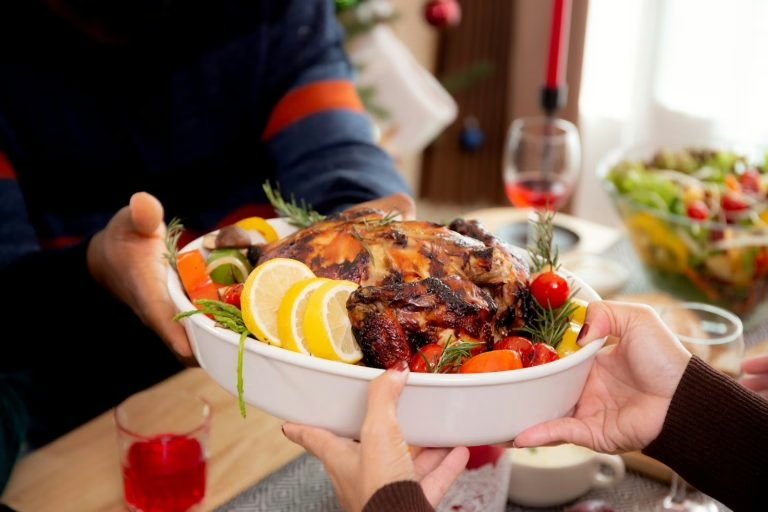
Link copied! It’s that time of the year again – it’s Christmas! Christmas is a time for us to celebrate and revel with those close to us and of course, that includes a huge, delicious meal to cap off the year. Most often than not, many people use the festivities as a reason to overindulge in alcohol, overly sweet desserts and beverages, and binge-eat heaps of food. But did you know that the type of food and quantity you are eating has a huge impact on your health? You Are What You Eat Binge-eating and overindulgence in alcohol/sweet beverages very often lead to weight gain, which brings in a whole other host of problems such as heart disease, Type II diabetes[1] and even mental issues such as depression[2]. In the TCM perspective, digestion is primarily governed by our Stomach and Spleen. Overeating festive foods and overconsumption of alcohol may result in: Weakened functions of the Spleen and Stomach Accumulation of heat in the Spleen and Stomach Dysfunction of the Spleen in transportation Internal retention of turbid phlegm and dampness Deficiency of Spleen Yang and Kidney Yang Qi stagnation and Blood stasis Tip of the day: To prevent yourself from overeating, have some light salads or healthy proteins before feasting! As your stomach senses satiety after a period of time, filling your stomach with healthy greens or proteins before meals can help to reduce your total calorie intake. Substitute your ingredients and opt for healthier choices Most of the time, if you are getting ready-made dishes from an external source, they could be made up of ingredients that are less healthy. However, if you have the luxury of time to make your own Christmas dishes from scratch, try substituting some of the commonly used ingredients for healthier alternatives! If a recipe calls for … Try switching to … Butter/Margarine Organic butter / Olive oil / Applesauce / Prune puree / Coconut oil Sour cream Fat-free plain yogurt Milk chocolate Dark chocolate Tortilla wraps Lettuce Soy sauce Low-sodium soy sauce Plain flour Whole wheat flour Canned fruits Fresh fruits White bread Wheat bread / Whole grain bread Bread crumbs Rolled oats / Crushed bran cereal Cream cheese Fat-free or low-fat cream cheese / Neufchatel cheese / Pureed low-fat cottage cheese Table salt Pink Himalayan salt Sugar Honey / Stevia / Maple sugar / Coconut sugar Milk Fat-free milk / Almond milk / Coconut milk If you are feeling adventurous, you can also try integrating TCM herbs into your Christmas recipes and create a fusion of East meets West dishes to wow the crowd. You will be surprised to learn that some Christmas dishes you have been cooking already use some of the more common herbs in TCM. Find out how to use these ingredients in the recipes below! (Remember to use these herbs in moderation!) 1. Fennel Seeds 茴香籽 Dissipates coldness and relieves pain Promotes the movement of Qi and disperses stagnation in the Stomach and Spleen to regulate and improve our digestive functions as well as gastrointestinal issues such as stomach bloating, gastric pains, flatulence and constipation. Warms the Kidney and Liver to help boost fertility and menstrual health. Also reduces menstrual cramps, and improves bone health Has anti-inflammatory and antioxidant properties[3] 2. Cinnamon 肉桂 Reinforces Fire and strengthens Yang energy to help keep the body warm Boost Kidney Yang which is essential for fertility and menstrual health Has anti-inflammatory and antioxidant properties Reduces cholesterol levels Lowers blood sugar and blood pressure 3. Nutmeg 肉豆蔻 Promotes Qi circulation to prevent diseases such as joint pain and edema. Good Qi flow can also help with emotion management and maintain good digestive health Warms the Spleen and the Stomach which helps treat diarrhea Reduces symptoms associated with digestive disorders, like nausea and vomiting 4. Turmeric 姜黄 Invigorates the Blood and removes stagnation of Qi or Blood in the body to help to alleviate pain, chest tightness and regulate mood! Dispels wind-cold-damp pathogens externally to prevent joint pains(痹证) Warms the body and restores Yang in the body to help keep the body warm Has anti-inflammatory and antioxidant properties [4] Improves Liver health which could possibly be damaged due to overconsumption of alcohol Reduces cholesterol levels 5. Cloves 丁香 Replenishes Yang energy and warms the body Warms the Stomach which relieves vomiting from the overconsumption of cold foods (e.g. sashimi, watermelon) Regulates Qi flow in the Stomach, which helps to improve digestion, reduce bloating or stomach discomfort 6. Thyme 麝香草 Dispels Wind pathogens, which commonly causes joint pains or flu Promotes the circulation of Qi which helps with pain management, chest tightness, stress management as well as mood regulation Tonifies Spleen and Stomach’s Qi and Yang energy which improves digestion and helps with gastrointestinal issues such as stomach bloating, gastric pain, flatulence, and constipation Tonifies and warms the Lungs which improves immunity and prevent cough or flu Helps reduce blood pressure 6 Healthy Christmas Recipes For The Holiday Season 1. Healthy Deviled Eggs Photo for illustration purposes only Ingredients: 12 Eggs 3 tbsp Plain Greek Yoghurt ¼ tsp Sea Salt ½ tsp Dried Fennel seeds ½ tsp Dried Dill Smoked Paprika or Paprika (to taste) Black Pepper (to taste) 1 tsp Lemon Juice Directions: Boil the eggs (hardboiled) and cut them into halves. Separate the egg yolks and egg whites. Place the egg yolks into a large bowl, set aside the egg whites. Mix in the yoghurt, sea salt, tarragon, dill, paprika, black pepper and lemon juice into the egg yolks. Pipe the egg yolk mixture into the egg white shells. 2. Herb-Infused Roasted Turkey Breast Photo for illustration purposes only Ingredients: 3kg Bone-in Turkey Breast 1 tbsp Minced Garlic 2 tsp Mustard 1 tbsp Chopped Fresh Rosemary Leaves 1 tbsp Chopped Fresh Sage Leaves 1 tsp Chopped Fresh Thyme Leaves 2 tsp Himalayan Salt 1 tsp Ground Black Pepper 2 tbsp Olive Oil 2 tbsp Lemon Juice 1 cup Dry White Wine (optional) Directions: Preheat the oven to 160 degrees celcius. Place the turkey breast, skin side up, on a rack in the
Kitchen Gadgets For Healthy Eating – It’s Easier Than you Think!
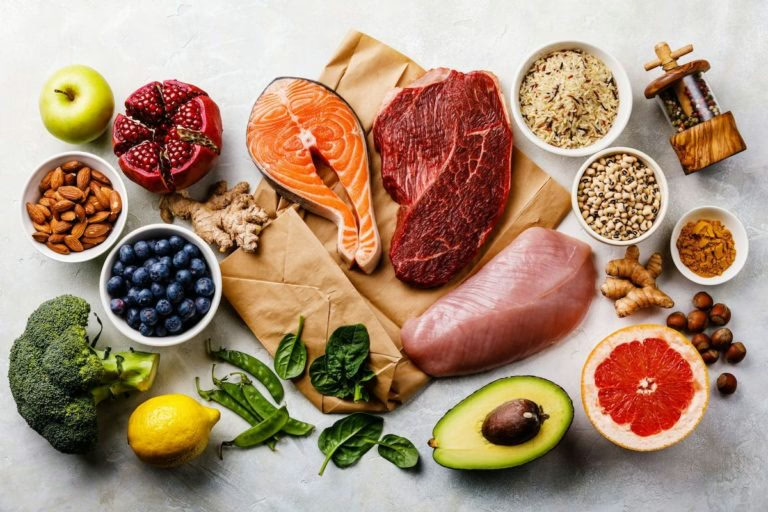
Link copied! You are what you eat. In the TCM perspective, it is strongly believed that good eating habits and good health go hand-in-hand together. With the pressures of working, eating healthy can be a challenge especially when you are exhausted, time-strapped and we know how cumbersome it can be to cook a meal from scratch. It is easy to cave in and enjoy quick meals with minimal cooking such as microwaved meals though we know that this is detrimental to your health in the long run. However, with technological advancement, there is a lower barrier to start eating healthy especially with this list of nifty and convenient healthy kitchen gadgets that you can invest in to embark on your healthy eating journey while embracing better eating habits. 1. Cold Press / Slow Juicer Photo: Sprout.net.au According to HPB guidelines, we should aim to eat 2 abundant servings of fruit and 2 servings of vegetables every day for a healthy diet.[1] One way to get your daily dose is via juicing. Juicing allows you to pack more fruits and vegetables in as it separates the fibre from the fruit or vegetable, leaving you with just the juice. The type of juicer you should be looking to buy is a slow juicer where no blades are used to crush fruits and vegetables. Bladeless juicers do not generate heat during the juicing process, retaining vitamins and minerals especially the heat-sensitive ones such as vitamin C. It also retains enzymes that are vital for nutrient intake. One of the slow juicers that we recommend is the Tribest Greenstar Elite, the world’s only juice extractor that features exclusive magnetic and bio-ceramic technology that allows juice extraction with maximum yield and higher nutritional content.[2] Juicing is one of the few popular diet options for cancer patients as they tend to struggle with nausea, loss of appetite etc. after undergoing conventional cancer treatment. Not only are juices easy to consume (since it is liquid), it also allows optimum levels of vitamins, minerals and phytonutrients to be absorbed into the bloodstream quickly for energy and nutrients. 2. Blender Photo: Vitamax Blender (Lazada) Puzzled by the differences between a blender and a juicer? The key differentiation is fibre as a blender processes the whole fruit or vegetable, perfect for making smoothies. Smoothies are a great nourishing source for cancer patients who are looking to up their fibre intake as they can help to remove toxins while including key nutrients into their diet, especially when appetites are suppressed and when they are not in the mood to stomach solid food. In addition, the fibre also keeps them fuller for longer periods. We recommend the Vitamix Vita-Prep 3 Blender, a commercial blender that combines both power and performance in one. With its ≈3 peak output horsepower motor, the high speed helps to keep optimum nutrient levels due to the faster blending process.[3] This is because less heat is generated to destroy heat-sensitive nutrients such as vitamin C, ensuring that your body is getting the high nutritional yield that it needs. 3. Water Distiller Photo: Purwa Water Distiller (Lazada) The human body is made up of over 70% water, drinking enough water and staying hydrated is essential for bodily functions such as maintaining healthy blood pressure levels, keeping healthy weight and energy levels, and flushing toxins out of the body. However, have you wondered how safe your water source is for drinking? In Singapore, water is treated using chemicals such as chlorine, which is used to destroy bacteria and viruses for disinfestation purposes; ammonia is added into chlorine water to form a stable chlorine residual; activated carbon is used to remove any bad taste and odour; fluoridation is a requirement for prevention of dental cavities. Even though Singapore’s good water quality is within the Singapore Environmental Public Health (Water Suitable for Drinking) (No. 2) Regulations 2019 and World Health Organisation (WHO) guidelines for drinking-water quality[4], what can we do to minimise the presence of these chemicals in the water we drink? Distilling water is the key. Distiling water has health benefits such as flushing toxins out. This is beneficial for cancer patients who already have compromised immunity. Moreover, dehydration is one of the key repercussions of conventional cancer treatment so it is imperative for cancer patients to stay hydrated. Presenting the Purwa Water Distiller, it helps to remove up to 99.9% of tap water contaminants for optimally clean water. You can read more about the Purwa Water Distiller here. 4. Food Dehydrator Photo: Excalibur Tray Dehydrator (Lazada) We are constantly barraged by diet fads but have you heard of a raw vegan diet? Under a raw vegan diet you will have to eat unprocessed plant-based food either completely raw or heated at very low temperatures between 40°c to 48°c. Cooking at such a low temperature ensures that enzymes are not destroyed and nutrient loss is minimal. When food is cooked at high temperatures, enzymes are destroyed and this lowers the nutritional value of the food, raising its acidity. Nutrients are converted from an organic state to an inorganic state and rendered useless to the body [5]. Looking for a kitchen gadget for your raw vegan indulgence? A dehydrator will do just the thing. One of the dehydrators that you can consider using to make flavourful and preservative-free snacks such as kale chips is the Excalibur 3926TB Dehydrator. Besides coming with BPA free trays with BPA free mesh screen inserts and adjustable temperature settings ranging from 40°c to 73°c (perfect for those on a raw vegan diet), its patented Parallex Horizontal Airflow technology helps food to dehydrate faster, retain more nutrients and look and taste better, without tray rotation.[6] Moreover, the temperature range is low enough to preserve the active enzymes in fruits and vegetables, perfect for cancer patients who are looking for ways to boost their immunity. 5. Electric Spiralizer Photo: Kenwood Appliances Eating right is of utmost importance for cancer patients, of which managing the carbohydrates intake is one
5 Ways To Strengthen Your Immunity Naturally | The TCM Way
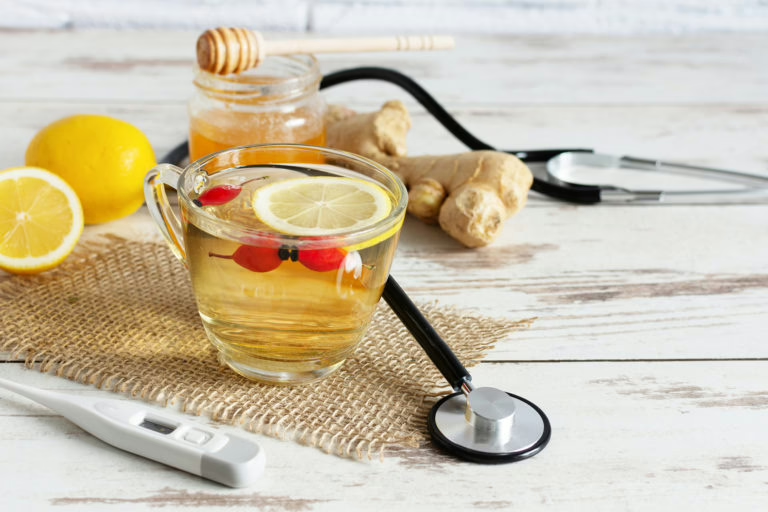
Link copied! A collaboration with Eatprayflying, originally posted on Eatprayflying.com Traditional Chinese Medicine (TCM) came under the global spotlight earlier this year when it served a critical role in China’s battle with COVID-19. As scientists around the world are racing against time to formulate a vaccine, more individuals worldwide are turning to traditional remedies to strengthen their immune system. In TCM, your body houses a vital energy called Qi which essentially creates a protective shield, protecting you from external pathogens. This is why TCM focuses on nourishing your Qi to strengthen your immune system! Signs of weak immunity A simple 👅 test can also indicate the state of your immunity – take a mirror or use your smartphone camera to do a quick check!A tongue with scallop outline/teeth marks and a greasy coating (middle picture) is a sign of Qi deficiency and weakened immunity. Other signs of a compromised immune system: Frequent colds/ flus/ body aches Chronic Fatigue Digestive Issues Chronic skin conditions, allergies and inflammation So what can you do to improve your immunity? 1) Eat yellow foods Did you know? Nearly 70% of your immune system is located in your digestive tract? This is why your gut health is so important in maintaining your overall health and immune system. According to TCM’s 5 element theory, the spleen is responsible for your body’s digestive functions and is linked to the colour yellow. Hence, yellow foods helps to nourish your spleen and improve your gut health. Best yellow foods for healthy diet: Pumpkin Sweet Potato Ginger Turmeric 2) Incorporate Huang Qi (Astragalus) for immunity Huang Qi (Astragalus) is one of the most commonly used herbs in TCM for Qi nourishment and has been an ancient favourite for more than 2000 years! It also has immunoregulatory, anticancer, antitumor and antioxidant properties, making it a powerful all-rounder. [1] Pro-tip: Choose The Right Huang Qi I always go for premium Huang Qi which is naturally grown and harvested – this means that they are chemicals & pesticides free! How to tell organic wild Huang Qi from farmed ones? 💛 Colour – Sliced organic Huang Qi’s yellow colour can vary from plant to plant depending on the environment it grows in. Cultivated ones tend to have a stronger yellow colour. 🌿 Fibre Pattern – Fibres on organic Huang Qi slices are not so defined and the pattern also varies from plant to plant. How to use Huang Qi? Physician Leong Weizhen from Oriental Remedies Group (TCM chain in Singapore) recommends using 1-3g of Huang Qi (with up to 1.5L of water) to brew tea on a daily basis 🍵 *Editor’s note: I’m personally very lazy to concoct my own tea so I usually opt for pre-packed tea bags like Oriental Remedies Group’s Immunity Tea! Oriental Remedies Group Immunity Tea 3) Massage acupressure points Use 4 of your own fingers to get an estimate of 3 inches TCM Physician’s recommendations Massage each point twice a day using finger massage/palmar massageFinger Massage: up to 5mins each timePalmar Massage: 10 – 15mins each time ☝🏽 Finger massage Press in deep and rotate your fingers, your fingers should be in contact with your abdomen as you massage the points. ✋🏽Palmar massage Place both palms facing your abdomen, one palm on top of the other and rotate both palms together in a single direction. 4) Reduce stress and get enough sleep Chronic stress and sleep deprivation (sleep hrs and quality) can weaken your Qi and immunity. This is very common in busy professionals who lead a stressful life with little time to unwind and rest. 💆🏻 Destress and refresh Set aside time for relaxation – if you don’t plan to take a break, you plan to not take a break. Prevent missing out on your downtime by creating an event on your work calendar, treat it as a task instead of an indulgence! 🛌 Get enough sleep hours and quality sleep Adults should aim to get 7 hours of good quality sleep daily. If you find it difficult to fall asleep or wake up feeling lethargic despite enough sleep hours, you could be making these 3 mistakes. More tips on how to sleep better here I used to think I could repay my slept debt during the weekends, little did I know that it was affecting my sleep quality! I shared more about tips on how to sleep better in another post – learn more! 5) Improve the air quality of your surroundings Researchers found that air pollution can suppress the immune system’s natural functions and was linked to causing a greater severity of asthma symptoms and lower lung capacity. [2]Prolonged exposure to poor air quality can cause chronic inflammation, asthma is merely one of the resulting conditions due to a malfunctioning immune system. Do indoor plants help? While plants are great additions to spruce up your place, their abilities in purifying the air of pollution has been overstated. They are unable to clean the air quickly enough to improve the air quality. [3] 🍃 Air Ionisers are more effective in cleaning the air Air ionisers emit negative ions that eliminate airborne pollutants including dust, bacteria and even viruses. Negative Ions work by attracting positively-charged pollutants in the air by making them heavier and fall to the ground. As a result, the air that we breathe in is now cleaned and safer. [4] PS, I invested in a Reltec’s Air Ioniser years ago and it is still going strong. It is a robust machine that is portable and small so you can keep it anywhere and move it to any indoor area as you wish. On Sale: Reltec’s Air Ioniser As Singapore reopens gradually, there will be a greater need to protect ourselves. Masks and social distancing habits are definitely a must but you can do more by strengthening your immunity naturally, the TCM way! If you need professional advice on strengthening your immune system, call/WhatsApp us at +65 8087 0486 to book an appointment with our bilingual physicians. Disclaimer:
Forget me not… TCM support for Dementia
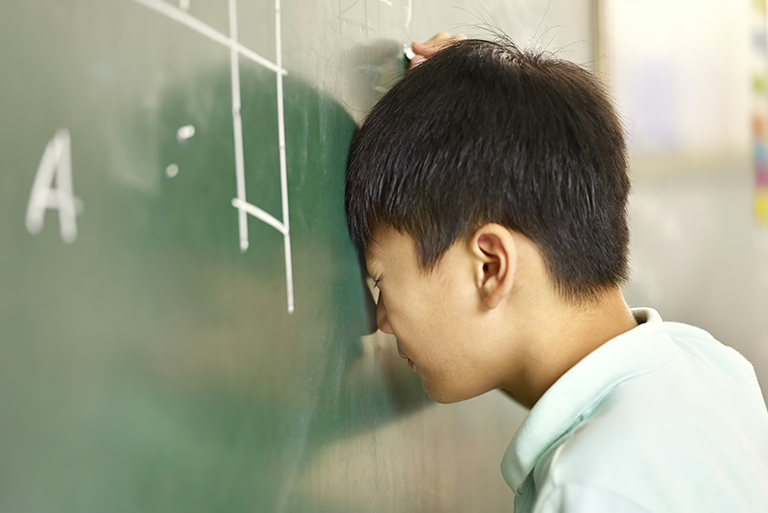
Forget me not… TCM support for Dementia Link copied! What is dementia and how does it affect you? Dementia is a disease of the brain that causes damage to the brain cells and causes the affected person to lose their memory and other cognitive skills. This can affect their ability to carry out everyday activities and may cause changes to their behaviour, mood and personality. Therefore, it can be emotionally distressing when a family member or you gets diagnosed with dementia. It gets even more distressing and taxing as the disease progresses, with the patient often requiring care for the simple things we take for granted like having a meal or going to the toilet. There are many types of dementia such as Alzheimer’s Disease, Vascular Dementia, Lewy Body Dementia, Frontotemporal Dementia, etc. However, the two most common types are Alzheimer’s Disease and Vascular Dementia. The cause of Alzheimer’s Disease is unknown but can be partly attributed to genes causing production and deposition of beta-amyloid plaques that can damage brain cells. Meanwhile, Vascular Dementia is most often caused by multiple small strokes that usually occur over several years. Causes of dementia from the TCM perspective From the TCM perspective, dementia can be caused by the following: 1) Lack of marrow in the brain Ageing or chronic illnesses can deplete the brain marrow, causing lack of nourishment to the brain. This can lead to degeneration which results in problems with memory and thinking skills. 2) Qi and blood deficiency Lack of qi and blood, which arises from chronic illnesses or a weak digestive system, can reduce blood flow to the Heart (which governs emotions and thoughts from the TCM perspective). This results in the manifestation of emotional problems and psychiatric conditions such as agitation or anxiety. 3) Kidney essence deficiency Kidney essence deficiency from old age and chronic illnesses can reduce the amount of essence that is being sent up to the brain to be stored as marrow for the nourishment of the brain. 4) Blood stasis and phlegm accumulation These toxins can block the flow of qi and blood to the brain. Furthermore, blood stasis and phlegm can develop fire or heat in the body over time, which can disrupt proper brain functioning. How can TCM help to cope with dementia? As the population ages, the number of people living with dementia has been on the rise. Conventional Western medicine can help to delay the speed of disease progression, but only for a limited period of time. Patients may develop side effects to these western drugs and some may even find it intolerable. Hence, over the years, there has been an increasing trend of dementia patients turning to TCM for dementia support worldwide. Patients and caregivers usually seek TCM to help cope with the variety of symptoms as dementia progresses, such as memory loss, attention problems, depression and anxiety. TCM is also used to help patients cope with the side effects from medication, such as nausea, poor appetite, constipation and headache. There are many clinical studies that show that TCM is effective in supporting treatments against dementia. TCM herbal medicine and acupuncture have been effectively used in clinical settings to help slow down the progression of the disease and in some cases improve the cognitive functions and ability of patients to do everyday activities. 1-4 For patients who are unable to handle the side effects from their medication or patients who have reached the advanced stage of dementia where conventional drugs can no longer produce meaningful changes in memory or behaviour, TCM can play a dominant role to help improve the quality of life and reduce social and economic burdens of the patient and their family. Research has shown that TCM can reduce the need for special nursing care and medical expenses. Past studies revealed that integrated TCM therapies can reduce the risk of urinary catheterization for people who have difficulty emptying their bladder due to weakness of bladder muscles[5] and reduce the risk of pneumonia among dementia patients who have difficulty in swallowing. 6,7 How can we help dementia patients at Oriental Remedies Group? Here at Oriental Remedies, we believe in tapping into both Traditional Chinese Medicine and Technology-Enhanced Therapies to help patients with dementia by leveraging on the scientific knowledge of our body’s physiology. As dementia is a complicated and multi-faceted issue, the synergistic combination of both treatments tends to produce better outcomes for patients with dementia. Acupuncture Acupuncture involves inserting very fine needles into specific points along the meridians to stimulate the flow of Qi in our body. Specifically, there is a special Meridian, Du Mai, which runs along the head and enters our brain. Several points on the Du Mai, as well as specific points on our head, can be used to improve cognitive functions. Acupoints Baihui (GV 20), Sishencong (EX-HN1) and Shenting (GV 24) are commonly used points with high clinical efficacy, especially so for acupoint Baihui (GV 20). Research has shown that GV 20 exerts its therapeutic effects by increasing dopamine levels. [8] Dopamine serves various important functions. Its functions include acting as a neurotransmitter and being a key regulator in synaptic plasticity, playing a key role in the transmission of signals in our brain. In addition, GV 20, together with Zusanli (ST 36), also preserves the integrity of our Blood-Brain Barrier (BBB) and reduce permeability. 8 Herbal Medication & Dietary Changes There are several herbs in TCM that are used to boost memory and cognitive functions. They are also used to manage behavioral and psychological symptoms associated with dementia. The most commonly used herbs for dementia patients include Thinleaf milkwort (远志), Ginseng(人参), Poria(茯苓), Chinese Angelica(当归) and Prepared rehmannia root(熟地). From the TCM perspective, Thinleaf milkwort can anchor the mind, dispel phlegm, and reduce swelling. Ginseng tonifies Qi, strengthens the immunity and tranquilizes the mind. Poria induces diuresis to drain dampness, invigorates the spleen function, and calms the mind. Chinese Angelica tonifies and activates blood, regulate menstruation, relieve pain, moisten the intestines and relaxes bowels. Prepared rehmannia root nourishes yin and replenishes blood, as well as reinforcing essence and marrow. There are numerous animals and in-vitro studies that indicate these herbs can elicit memory-cultivating effects through mechanisms such as eliciting
What can TCM do for Patients with Stroke?
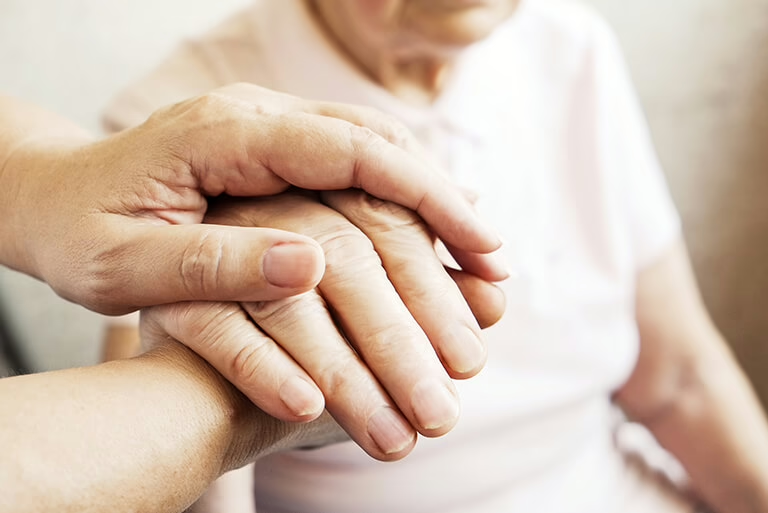
What can TCM do for Patients with Stroke? Link copied! Stroke is deadly and dreadful Stroke remains the fourth leading cause of death in Singapore and is one of the top contributors of adult disability – 63% of stroke patients have some disability within three months. The silent and deadly nature of stroke, as well as the resulting long-term disability, makes it one of the most dreadful illnesses which everyone fears. Traditional Chinese Medicine (TCM) has been used for many centuries and is still widely used today in many countries (especially south and east Asia) for the treatment and prevention of stroke, complementing conventional western medical care. However, most people are still unaware of the benefits that TCM can offer in the long, arduous process of stroke rehabilitation. This article hopes to shed light on how TCM views stroke, the types of TCM treatments and their benefits in stroke recovery. What is stroke? From a biomedical perspective, stroke occurs when blood supply to the brain is interrupted. This causes brain cells to lose their function, thus leading to the signs and symptoms commonly observed. There are two main types of stroke: Ischaemic stroke occurs due to blockage of the blood vessel, limiting blood flow to the brain. It is the most common type, accounting for 74% of strokes in Singapore. Hemorrhagic stroke occurs due to rupture of a blood vessel, causing bleeding into the brain. This makes up 24% of strokes in Singapore. Please note: all words in Italics mentioned henceforth refer to the TCM organ-system and not the anatomical organ referenced in western medicine. Meanwhile, in TCM theory, stroke is more than just an illness of the brain as it affects the meridians and other organs as well. From TCM perspective, stroke has been thought to be caused by internal and external influences, resulting in disrupted and unsettled flow of Qi and blood in the body which ultimately rush upwards to the head. Knowing and understanding the internal and external factors contributing to the development of stroke enables one to take precautionary actions to reduce the risk of stroke occurrence. Early identification and intervention for stroke It is well-established that timely intervention at the onset of acute stroke is crucial as more brain tissues can be rescued. This translates into saving body functions and better quality of life for the patient in the long run. Therefore, being aware of stroke symptoms and seeking immediate treatment by calling the ambulance is life-saving knowledge which everyone should know. Common symptoms of stroke include: Sudden weakness or numbness of the face, arm or leg, especially on one side of the body Sudden slurring of speech Sudden trouble walking, dizziness, loss of balance or incoordination Sudden severe headache with no known cause Sudden trouble seeing in one or both eyes Stroke prevention from TCM perspective There are two aspects in prevention – fresh occurrence (people who did not have a stroke before) and reoccurrence (people who experienced stroke before). Among the TCM community, it is generally accepted that the five TCM entities associated with stroke are Wind (风), Fire (火), Phlegm (痰), Stagnation/Stasis (瘀) and Deficiency (虚) respectively. The concept of what each entity encompasses and what should be done to mitigate these deficiency, excess, stagnation and imbalance are detailed as below: 1) Deficiency This internal risk factor arises due to Yin deficiency of the Liver and Kidney. As the human body ages, Liver and Kidney Yin decreases (ageing is something that one cannot change). Although natural ageing is non-modifiable, we can cultivate healthy habits to help conserve the Liver and Kidney Yin, such as: Sleeping early at night (before 11 pm) Having sufficient rest by not overworking (long hours under stressful conditions) Eat Yin nourishing food such as deep, green leafy vegetables, cucumber, celery, millet, eggs and fish Avoid fried, grilled food which causes heat and exhausts Yin 2) Fire (Heat) Yin deficiency results in the production of heat that damages Yin, further aggravating Yin deficiency in the body. Late-night sleep and prolonged extremes of emotions such as anger, frustration and stress bring about fire in the Heart and Liver. If left untreated, this pathogenic fire (imbalance in the body) within the body will deplete Yin to an extent of generating Liver Yang and subsequently Liver Wind which predisposes one to stroke. Some simple ways to mitigate the level of heat in the body: Adopting a regular diet of heat clearing food such as lotus seeds and lily bulbs Sleeping early Maintaining a positive and cheerful mindset 3) Phlegm Like Wind, Phlegm is also a TCM pathogenic factor produced in the body and causes many diseases. Eating irregularly or ingesting excess dairy products, rich, fatty and sweet food weakens the Spleen and leads to the production of Phlegm, which predisposes the body to obesity. In TCM theory, Phlegm causes numbness in the extremities, mental clouding, slurred speech or aphasia, and a swollen tongue with a sticky coating. Extreme physical work, including excessive exercise and sports, also weakens the Spleen and can lead to Spleen deficiency, which in turn causes Phlegm. 4) Stagnation/Stasis Qi stagnation can result from either Qi deficiency or stress. Stagnation, in turn, causes Blood stasis which affects the meridians and joints, causing stiffness and pain in the extremities which are commonly experienced by stroke patients. By exercising, keeping active and doing activities which relieve stress, Qi stagnation can improve. Having adequate rest and a well-balanced diet also helps to alleviate Qi deficiency. 5) Wind Wind must not be taken literally as what we feel in the natural environment. In TCM, there is External Wind and Internal Wind. It is believed that Wind causes the sudden loss of self-awareness in an acute stroke attack, and its subsequent hemiplegia. Liver Yang is formed as a result of severe Liver and Kidney Yin deficiency. This Liver Yang will subsequently induce Liver Wind (Internal Wind) which is a causative agent of stroke, coma, mental clouding and paralysis. Internal and External Wind can interact because the second can shape the first. To quell the formation of Internal Wind, it is important to recognize there are different types of Internal Wind which must be differentiated and dealt with accordingly in clinical practice. The most pertinent categories of differentiation of Internal Wind theory are Heat, Phlegm and Qi deficiency. Post-stroke rehabilitation Besides undergoing the standard care pathway for stroke defined by western doctors, patients can also receive TCM treatment as a complementary form of support to maximize recovery. It is noteworthy that treatments such as acupuncture should be carried out as frequently as three times per week during the first three months after experiencing a stroke.
Insomnia – Don’t sleep on your sleep disorder
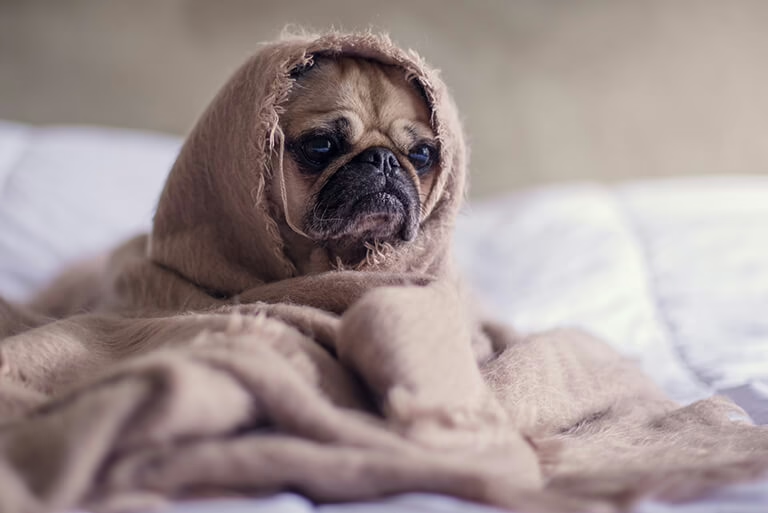
Insomnia – Don’t sleep on your sleep disorder Link copied! Insomnia is a real and rising problem plaguing populations all over the world. A sleep survey done in 2016 revealed that the average Singaporean sleeps just slightly over 7 hours a day, and compared to other countries surveyed, Singaporeans sleep at a later hour at around 11.45pm. Globally, about 6 in 10 adults have sleep-related issues, with about 26% facing insomnia. Amongst these people, 60% face disrupted sleep due to worrying, primarily overwork, financial or economic issues. Moreover, the percentage of time in the deep sleep stage decreases with age due to various factors like stress, pain, illness and medical problems. [1] If this sounds like you, read on! Singaporeans are one of the most sleep-deprived people in the world!! Source: statista.com / Science Advances What exactly is insomnia and why should we treat it? So what exactly is insomnia? Insomnia is the complaint of inadequate or poor-quality sleep that interferes with normal daytime functioning. Some people may think that insomnia is mere difficulty falling asleep, but so long as you are feeling too tired the next day for your daily activities, you should consider other forms of insomnia you may have – waking up in the middle of the night with problems falling back to sleep or waking up too early in the morning. [2] Such poor quality sleep often leaves people feeling unrefreshed, lethargic, or groggy when they wake up in the morning. Many people have disregarded their sleep quality or the lack of sufficient hours, failing to realize the health implications that come with sleep deficiency. The short term effects of insomnia include poor concentration, stiff neck, changes in appetite, mood swings, headaches etc. Poor sleep quality over a prolonged period will lead to lower immune system and poor mental health function, and this combination may have dire consequences on our health potentially leading to cancers, diabetes, hypertension and hormonal imbalances. [3] Short term insomnia, when neglected, can easily become chronic insomnia, which is characterized by more than a month of inadequate sleep. Once chronic insomnia develops, it will be more difficult to manage and restored back to normal. How can we help deal with Insomnia here at Oriental Remedies Group? Earlier on, we have shared lifestyle habits to avoid – 3 Mistakes You Are Committing That Prevent You From Having A Good Night’s Sleep to help you achieve better sleep. One of the natural remedies includes our concoction of Qi Stagnation Calming Tea to help alleviate sleep disorders such as Insomnia. Here, we will be sharing how Insomnia can be treated using a conventional TCM approach, as well as with our Technology-Enhanced Therapies uniquely found here at Oriental Remedies. The approach that TCM uses to treat insomnia is through regular acupuncture and herbal medication. Herbal Medication & Dietary Changes Liver, heart, spleen and kidney are the key organs that we need to regulate. Symptoms like dizziness, migraines, fatigue, and forgetfulness are all symptoms associated with liver yin deficiency, liver and heart fire, spleen and kidney deficiency. Other than identifying and treating the root cause of insomnia, the use of herbs like 黄芩Scutellaria baicalensis、茯神Poria cocos、肉桂Chinese cinnamon etc in the prescribed herbal medications can also treat some symptoms associated with insomnia like migraines, bad breath, poor digestion and obesity. Acupuncture By stimulating acupoints like 太溪、三阴交 etc. that can boost the liver and kidney energy, regular sessions of acupuncture can help in restoring and re-balancing the yin and yang energies essential for boosting the quality of sleep. Due to the wide spectrum of symptoms and conditions that can be caused by insomnia, it is always more beneficial to combine both acupuncture and herbal medicine in the treatment of insomnia. Besides traditional TCM treatments, Oriental Remedies Group also offers Technology-Enhanced Therapies to enhance overall health in patients. Electro-Lymphatic Therapy (ELT) Electro-Lymphatic Drainage Therapy (ELT) is a gentle and non-invasive therapy that helps to stimulate proper flow and drainage of the lymphatic system, simulating the effects of a lymphatic drainage massage or tuina without the pain and pressure. According to research, the loss of sleep, even for a few short hours during the night, can prompt one’s immune system to turn against healthy tissue and organs. Thus, in people with chronic insomnia, there exists tissue-damaging inflammation in the organs that in the long run, may lead to cardiovascular diseases, diabetes, and cancer. With good lymphatic drainage, immune cells can be brought within the lymph fluids to clear damaged cells like inflammatory mediators. By combining TCM treatments with such Technology-Enhanced Therapies, we aim to achieve overall well-being and help achieve better quality sleep. Your healing is the most important! In Oriental Remedies Group, we have more than 10 certified bilingual TCM Physicians. Each of them has been trained in both Nanyang Technological University (Singapore) and China for a minimum of 5-8 years, in both Biomedical Science and TCM before being certified to practice in Singapore. Specifically, we have Physician Ng Mei Yun who specializes in treating insomnia and diabetes, to name a few. Insomnia is so common that many around us often overlook this issue. Action has to be taken fast to correct this disorder through lifestyle changes and early treatments. When the problem becomes chronic, your body is unable to easily get back to its proper sleep cycle and will need stronger actions to be taken to address your sleep disorder. Treatment progress may become longer and more complicated. If you suffer from Insomnia or knows of anyone who do, take action now to get it resolved! Do not sleep on it! Please contact us at +65 8087 0486 for a personalized consultation. This article is written by Senior Physician Ng Mei Yun, with contributions from Senior Therapist Hannie Hong. Disclaimer: The information on this page is for information and educational purposes only. Such medical information may relate to disease, injury, drugs and other treatments, medical devices and/or health products. Medical information does not amount to advice, and if advice is needed an appropriate professional help should be sought. The disclaimer asserts that no warranties or
Effectively Counter Ageing And Chronic Diseases With TCM
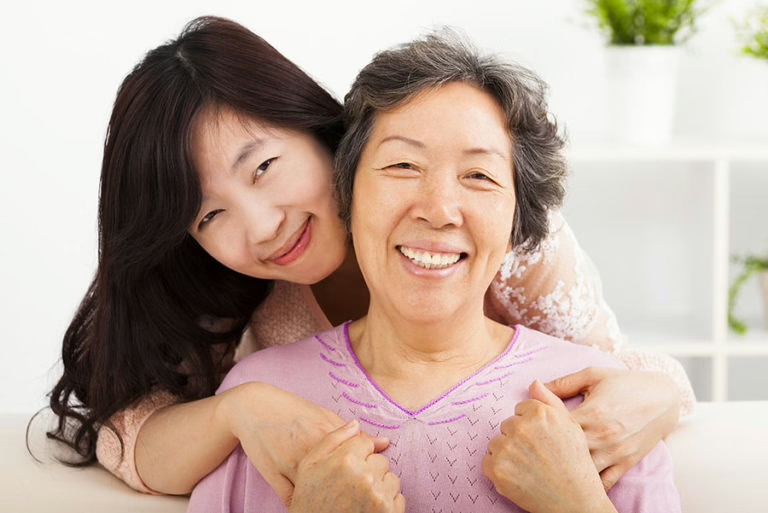
Effectively Counter Ageing And Chronic Diseases With TCM Link copied! Ageing is a natural, yet complex process that occurs in everyone. In the latest biomedical research, it is revealed that telomere length can be used as an indicator of a person’s biological age (which is different from chronological age). Research has shown that many factors – including exercise, sleep, emotional dysregulation and certain gene mutations – can reduce telomere length and result in premature biological ageing. An example would be a recent study which demonstrated that children who had lost their fathers had significantly shorter telomeres. According to ‘Shen Nong’, who is venerated as the Father of Chinese Medicine, the process of ageing typically begins after 35 years old and is characterized by a decline in bodily functions. From a TCM perspective, ageing is the process of losing kidney ‘qi’ and essence along the kidney meridian. The meridians are energy channels that allow qi to flow throughout the body. Similar to the concept of shortening telomeres, we believe that both internal and external factors contribute to ageing in TCM. What will I expect during the process of ageing and why is this a concern? Typically, once we reach the peak of our lives at the age of 28 and 32 years old respectively for females and males, our bodily functions gradually start to decline. Many people do not see this as a problem since everyone has to go through this phase. However, chronic diseases and conditions are on a rise worldwide and we now see an increasing trend of younger people having such conditions. This means that people are ageing ahead of their chronological age, due to a variety of reasons. There is a need to have preventive measures in place before the onset of such conditions and TCM treatments are getting more popular in the prevention and slowing down of disease progression. Some of the signs and symptoms that accompany the process of ageing include high blood sugar, high blood pressure, high cholesterol, decreased appetite, poor sleep, fatigue, incontinence, dizziness, gray hair, hair loss, fragile bones, etc. Although this is a natural process, the symptoms that accompany the ageing process can sometimes be very uncomfortable and at times, pose danger to our lives. If these signs and symptoms are not controlled well, they often develop into chronic diseases such as cardiovascular disease, chronic obstructive pulmonary disease (COPD) and stroke. The tendency to succumb to illnesses increases as age progresses due to a decrease in bodily functions, which in turn lowers immunity. A decline in mental ability during the process of ageing could potentially result in dementia or psychiatric disorders such as depression. What causes the development of ‘ageing’ diseases from a TCM perspective? From a TCM perspective, age-related changes are mainly due to organ degeneration and exhaustion of fundamental substances (from a functional aspect). [1] When there is an imbalance of the fundamental substances, pathological changes take place and disease progression occurs. 1) Exhaustion of fundamental substances The human body is made up of a continuous, dynamic system of fundamental substances such as qi, essence (jing), blood, body fluids and spirit (shen), that interact together to create the activities making up life. In the natural process of ageing, these substances gradually weaken and becomes depleted, slowing down bodily activities. This is reflected in the common signs of ageing, such as loss of hair, fragile bones, and gray hair. 2) Organ degeneration The kidneys store the essence of life and have the most important role in the process of ageing. With depletion in the essence, the kidneys main function of propelling life and maintaining physiological balances fails and hence leads to a decline in vitality. Another major organ that contributes to the process of ageing is the spleen, which is a manufacturer of qi, as well as a good storage place for qi. As we age, the function of the spleen in metabolizing nutrients decreases, and it is no longer able to ensure proper nourishment and replenishment of the body. The organs in our body become under-nourished and this contributes to various conditions such as fatigue, dizziness, loss of appetite and poor sleep. 3) Accumulation of metabolic wastes Environmental influences or lifestyle habits such as overeating, straining, inadequate exercise and stress contribute to the accumulation of metabolic wastes. As we age, the function of internal organs slow down and they can no longer remove metabolic wastes as effectively. In TCM, the San Jiao works to help remove metabolic waste and it is important to maintain its optimal function as we age. How do we help patients with chronic diseases here at Oriental Remedies Group? Fret not, as there is hope. Your biological age can be much younger than your chronological age with proper and timely intervention. Herbal Medication & Dietary Changes Herbal medication helps in countering chronic diseases by replenishing the fundamental substances. The active ingredients of herbs play a great part in the replenishment process. Herbs such as ginseng contains bio-active metabolites which help to increase lifespan and regulate the function of multiple organ systems, including the cardiovascular and nervous systems, through its antioxidant and anti-inflammatory properties. Another common herb, gouqi, has been reported to mediate significant anti-ageing effects through anti-oxidant, immunoregulative, and anti-apoptotic activities and reducing DNA damage. Acupuncture Acupuncture is the insertion of fine, thin needles through the skin at particular acupoints to help stimulate specific functions. Acupuncture typically increases blood circulation to the area, promotes elasticity of muscle fibers and improves muscular contractility. As such, it helps to stimulate collagen production, clear blockages, correct imbalances of Yin and Yang energy and promote self-healing of the body. Massaging certain acupoints also helps in removal of toxins to improve conditions such as high blood pressure and high cholesterol. Electro-Lymphatic Therapy (ELT) Electro-Lymphatic Drainage Therapy (ELT) is a gentle and non-invasive therapy that helps to stimulate proper flow and drainage of the lymphatic system, simulating the effects of a lymphatic drainage massage or tuina without the pain and pressure. ELT is performed using an FDA-registered wellness device to boost your overall wellness. Good lymphatic drainage helps with the removal of metabolic wastes, excess
Chinese Four Herbs Soup – Dessert Edition
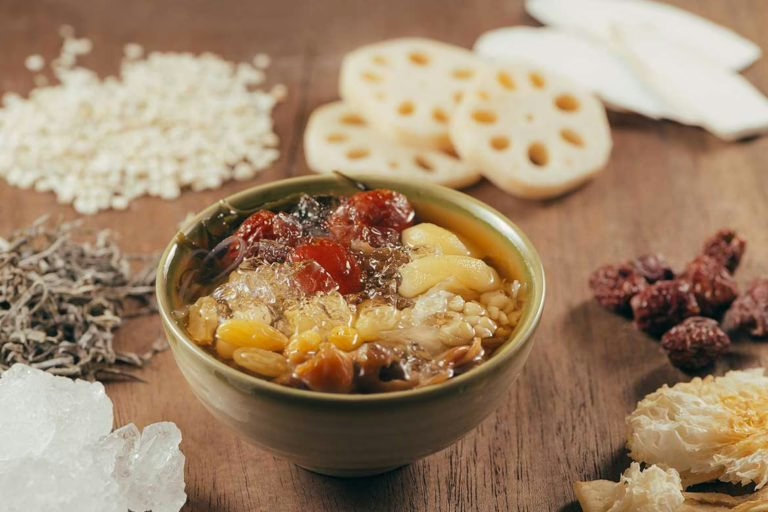
Link copied! Another common body constitution in Singapore is Qi Deficiency. This constitution greatly affects your immunity. To help, we have adapted a popular soup recipe for dessert to invigorate your Qi. But first, let’s look at some common indicators of Qi Deficiency: Often short of breath/fatigue, dizziness, feeble voice (esp. after exercising) Catch flu/cold easily, sinusitis, sensitive to environmental changes (weaker immune system) Palpitations, lower backaches, frequent urination, impotence or low libido. Pelvic Organ Prolapse (dropped bladder, bowel, rectum, uterus) Excessive sweating, teeth marks on the tongue, bloating especially after eating, sluggish bowel movements Qi Stagnation was a topic explored in one of our corporate talks from September 2019.To know more about our talks, kindly contact us. Recipe for Qi Invigorating Dessert Soup Four Herbs Dessert Soup An alternative take on theChinese Four Herbs Soup (Si Shen Tang 四神汤) Chinese Yam – Shan Yao 山药 23 grams Poria – Fu Ling 茯苓 30 grams Gordon Euryale Seeds – Qian Shi 芡实 30 grams Lotus seeds – Lian Zhi 莲子 30 grams Optional ingredients to make your soup tastier: Rock sugar Red dates Longan Gingko nuts White fungus Silky tofu skin Instructions Bring ingredients up to a boil in 1.5L to 2L of water. Lower heat and let simmer for at least 1 hr. Allow it to cool before serving. We recommend you serve it warm and with less sugar, opt for natural sweeteners like Red dates or Honey. Warm foods are also more beneficial than cold or iced options. Check out our Calming Tea recipe for Qi Stagnation here. Check out our nourishing meat and soup recipe here. Disclaimer: The content on this page is for information and educational purposes only. Such medical information may relate to disease, injury, drugs and other treatments, medical devices and/or health products. Medical information does not amount to advice, and if advice is needed an appropriate professional help should be sought. The disclaimer asserts that no warranties or representations are given in respect of the medical information, and that the website operator should not be held liable if a user suffers any injury or loss after relying upon the medical information. RELATED TOPICS YOU MIGHT ALSO LIKE